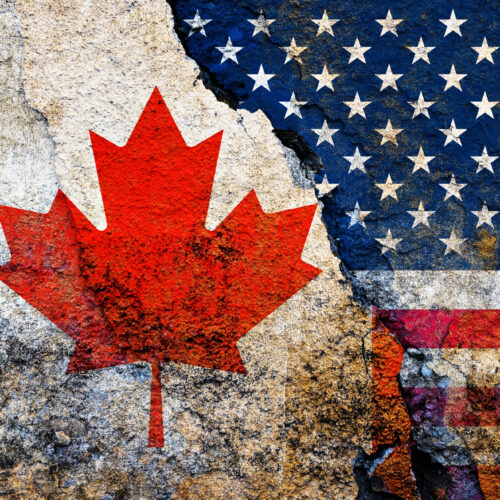US tech companies escape Canada digital services tax due to Trump tariffs.
In a sudden reversal, Canada has caved and will remove its digital services tax after trade talks with the US suddenly fell apart this weekend.
Blocked just hours before taking effect, the controversial digital services tax (DST) would have charged big US tech companies like Apple, Google, and Meta a 3 percent tax on all digital services revenue earned from Canadian users. Frustrating US tech giants, Canada also sought to collect retroactive taxes dating back to 2022.
Over the weekend, President Donald Trump claimed the tax was a “direct and blatant attack” on US tech companies and terminated the trade talks, while threatening to impose a new tariff rate on Canadian goods by July 4.
On Sunday, Canadian Prime Minister Mark Carney seemingly bowed to Trump’s pressure campaign, abruptly doing an “about turn” after previously refusing to pause the DST despite Trump’s opposition, NBC News reported.
But it wasn’t just Trump pushing Carney to reconsider the tax. A nonprofit representing CEOs and leaders of some of Canada’s biggest businesses, the Business Council of Canada, had warned that Carney defending the tax risked “undermining Canada’s economic relationship with its most important trading partner,” Al Jazeera reported.
If Trump were to impose new tariffs on Canada, it could have “large ripple effects across both economies,” the Council warned, potentially disrupting markets for automobiles, minerals, energy, and aluminum. And Trump—who has been bashing Canada with annexation threats throughout trade talks—had also threatened a Section 301 investigation into impacts of the DST on the US economy, which meant other punitive measures could be coming if the DST wasn’t removed. To Canada’s business leaders, the costs of defending the DST were seemingly becoming too high.
“That unfortunate development has now come to pass,” the Council told Carney. “In an effort to get trade negotiations back on track, Canada should put forward an immediate proposal to eliminate the DST in exchange for the elimination of tariffs from the United States.”
In a statement, Canada’s finance ministry announced that legislation will be drafted to officially rescind the DST. It also confirmed that Trump and Carney are now working toward a deal that should be announced by July 21.
Seemingly acknowledging Canadian business leaders’ concerns, Canada’s Minister of Finance and National Revenue, Francois-Philippe Champagne, said that “rescinding the digital services tax will allow the negotiations of a new economic and security relationship with the United States to make vital progress and reinforce our work to create jobs and build prosperity for all Canadians.”
EU won’t back down on digital services taxes
According to Canada’s finance ministry, rather than an attack on the US, “the DST was announced in 2020 to address the fact that many large technology companies operating in Canada may not otherwise pay tax on revenues generated from Canadians.”
While Canada remained firmly resistant to rescinding the DST during earlier stages of trade talks with Trump, the ministry on Sunday noted that “Canada’s preference has always been a multilateral agreement related to digital services taxation.” Canada may think that path could still be available, as dozens of other countries agree it’s necessary.
Canada only enacted the DST in 2024 after years of negotiations reportedly stalled between 38 countries, including the US, which formed the Organization for Economic Co-operation and Development (OECD) and strove to strike a global agreement devising how to fairly tax digital companies, Al Jazeera reported.
Not acknowledging the OECD, Trump had criticized Canada as “obviously copying the European Union, which has done the same thing” with DSTs. In the EU, several member states have imposed DSTs, and there’s speculation that Trump’s success in US-Canada talks could foreshadow his next move to potentially seek to eliminate DSTs in the EU.
But the European Commission, which has also been taking part in OECD discussions, still plans to keep DSTs on its agenda, Al Jazeera reported. And although Trump claimed on social media that the EU’s DSTs are “currently under discussion” in trade talks, the EU has denied that any tech laws are part of negotiations with the US, Reuters reported.
Instead, in addition to planning to defend the DSTs, the EU will also defend other strict tech laws in Trump’s crosshairs, like the Digital Markets Act and the Digital Services Act. Those “will not be changing,” European Commission spokesperson Thomas Regnier said at a recent news conference—seemingly no matter what’s happening between the US and Canada.
“We are not going to adjust the implementation of our legislation based on the actions of third countries,” Regnier said. “If we started to do that, then we would have to do it with numerous third countries.”
US-EU talks are supposed to wrap up by July 9. If not, Trump has threatened more tariffs on key EU exports like cars and steel, Al Jazeera reported. In retaliation, the EU could impose tariffs worth more than $110 billion on “a broad range of US exports,” Al Jazeera reported.
Ashley is a senior policy reporter for Ars Technica, dedicated to tracking social impacts of emerging policies and new technologies. She is a Chicago-based journalist with 20 years of experience.





